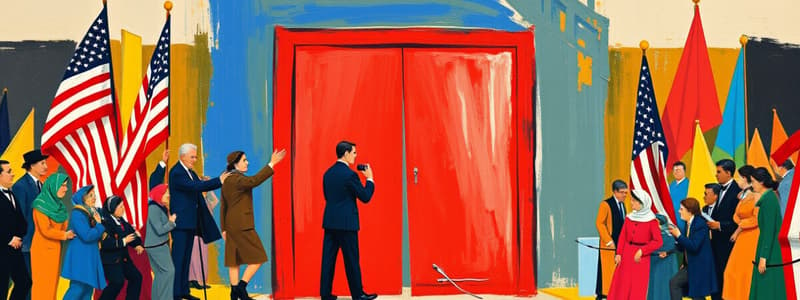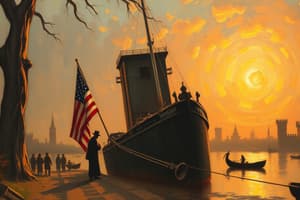Podcast
Questions and Answers
What is the definition of imperialism?
What is the definition of imperialism?
- A policy of extending a country's power and influence through diplomacy or military force (correct)
- A type of economic policy
- The act of colonizing a country
- A cultural movement in art
The Open Door Policy was initiated by the US to protect equal privileges among countries trading with China.
The Open Door Policy was initiated by the US to protect equal privileges among countries trading with China.
True (A)
Who was John Hay?
Who was John Hay?
Secretary of State who articulated the Open Door Policy
What was the Spanish-American War?
What was the Spanish-American War?
What event triggered the US to declare war in 1898?
What event triggered the US to declare war in 1898?
What does yellow journalism refer to?
What does yellow journalism refer to?
What is the Anti-Imperialist League?
What is the Anti-Imperialist League?
Who was the 26th President of the US?
Who was the 26th President of the US?
What is 'The Influence of Seapower Upon History'?
What is 'The Influence of Seapower Upon History'?
What is Dollar Diplomacy?
What is Dollar Diplomacy?
Who was William Taft?
Who was William Taft?
What were Reconcentration Camps?
What were Reconcentration Camps?
What was the outcome of the Battle of San Juan Hill?
What was the outcome of the Battle of San Juan Hill?
What does the Teller Amendment guarantee?
What does the Teller Amendment guarantee?
What were the Rough Riders?
What were the Rough Riders?
What was the Filipino-American War?
What was the Filipino-American War?
Who is Emiliano Aguinaldo?
Who is Emiliano Aguinaldo?
Who was William McKinley?
Who was William McKinley?
What were the Open Door Notes?
What were the Open Door Notes?
What is the Roosevelt Corollary?
What is the Roosevelt Corollary?
What was the Treaty of Paris of 1898?
What was the Treaty of Paris of 1898?
What is the Panama Canal?
What is the Panama Canal?
What was the Boxer Rebellion?
What was the Boxer Rebellion?
What is Manifest Destiny?
What is Manifest Destiny?
Who was Valeriano Weyler?
Who was Valeriano Weyler?
Who was Queen Liliuokalani?
Who was Queen Liliuokalani?
What is the significance of Dollar Diplomacy?
What is the significance of Dollar Diplomacy?
Who was Commodore George Dewey?
Who was Commodore George Dewey?
What does the term 'A Splendid Little War' refer to?
What does the term 'A Splendid Little War' refer to?
Study Notes
Key Concepts of American Imperialism
- Imperialism: Policy of expanding a nation's power and influence through diplomatic or military means.
- Open Door Policy: Initiated in 1899, aimed to ensure equal trading rights in China, promoting international trade and welfare.
- Spanish-American War (1898): Conflict instigated by U.S. intervention in Cuba. Catalyzed by the explosion of the USS Maine.
- Yellow Journalism: Sensationalist reporting that prioritized profit over factual news, influential during the build-up to the Spanish-American War.
Notable Figures in American Empire
- John Hay: Secretary of State who articulated the Open Door Policy and dubbed the Spanish-American War "A Splendid Little War."
- Theodore Roosevelt: 26th U.S. President, leader of the Rough Riders during the Spanish-American War, known for his assertive foreign policy.
- William Taft: 27th President and later Chief Justice, famously associated with Dollar Diplomacy.
- Alfred Thayer Mahan: Naval officer whose book emphasized the importance of naval power in global politics.
Military and Political Events
- The Maine: U.S. battleship whose explosion in Havana Harbor led to the declaration of war against Spain.
- Rough Riders: A volunteer cavalry regiment led by Roosevelt that played a key role in the Battle of San Juan Hill.
- Filipino-American War (1899-1902): Conflict between the U.S. and Filipino revolutionaries as they fought for independence.
- Battle of San Juan Hill: Notable battle during the Spanish-American War that marked a turning point in favor of U.S. forces.
Legislative and Treaties
- Teller Amendment: Passed in 1898; assured the U.S. would not annex Cuba after the war.
- Treaty of Paris (1898): Ended the Spanish-American War; Spain relinquished Cuba and ceded Puerto Rico, Guam, and the Philippines to the United States.
- Platt Amendment: Added to the Army Appropriation Bill in 1901; established conditions for U.S. interventions in Cuba.
- Open Door Notes: Series of diplomatic messages affirming U.S. trading rights in China, sent to major world powers.
Impacts and Reactions
- Anti-Imperialist League: Formed in 1898 to oppose the annexation of the Philippines, advocating against imperial overreach.
- Reconcentration Camps: Established by Spanish General Weyler for Cuban insurgents, drawing criticism for humanitarian abuses.
- Boxer Rebellion (1900): Anti-foreign uprising in China, reflecting resistance against Western colonial influence.
Expansion and Infrastructure
- The Panama Canal: Completed canal connecting the Atlantic and Pacific Oceans, a strategic asset for trade and military movement.
- Manifest Destiny: Ideological precursor to imperialism, asserting that U.S. expansion was both justified and inevitable.
- Commodore George Dewey: Naval commander known for leading the U.S. fleet to victory in the Battle of Manila Bay during the Spanish-American War.
Significant Figures and Influences
- Valeriano Weyler: Spanish general known for his brutal tactics in Cuba, which fueled anti-Spanish sentiment in the U.S.
- Queen Liliuokalani: The last monarch of Hawaii, faced U.S. annexation pressures.
- Emiliano Aguinaldo: Leader of the Filipino independence movement, recognized as the first President of the Philippines.
Studying That Suits You
Use AI to generate personalized quizzes and flashcards to suit your learning preferences.
Description
Test your knowledge of American imperialism with these flashcards from Chapter 19 of the American Yawp. This quiz covers key terms, policies, and historical figures that shaped the era of American empire. Perfect for students wanting to reinforce their understanding of U.S. foreign policy during this period.




